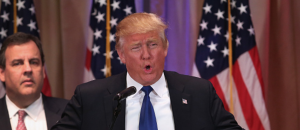Two elections ago, my husband, three friends, and I created an organization called “Evangelicals for Mitt” which dealt with the “religion issue” that invariably came with promoting a Mormon candidate. We talked about how Christians could — in good conscience — support Gov. Romney, by dissecting every imaginable theological implication. We used the Bible. We used history. We prayed. We had discussions at church with people who thought we were theologically misguided for supporting Mitt over more evangelical options.
We also spent a considerable amount of time defending Gov. Romney’s record on issues like abortion, marriage, and healthcare. In fact, we did this for years. (Our efforts started before Gov. Romney even declared the first time.) We traveled to major Christian leaders, we organized straw polls, and we met so many kind hearted Mormons encouraged by our efforts. (And, I’ll admit it, a few weird ones.)
Only now, do I realize that those eight years of sitting in Christian voters’ homes, holding a Bible between us as we discussed the proper intersection of faith and politics, were a farce. The conversations went something like this.
2012
South Carolina voter: I can’t support Mitt, because he flip flopped on the life issue.
Me: While it’s true that he once held pro-choice beliefs, he never had ONE action as a leader that was pro-choice.
South Carolina voter: Well, he has no track record to prove he’s changed.
Me: Great news! In Massachusetts, he proved he was pro-life over and over. For one, he vetoed a bill to give kids access to emergency contraception without parents’ knowledge.
South Carolina voter: Meh.
Me: He promised a “moratorium” on changes to abortion laws in his 2002 gubernatorial run (which was effectively a pro-life position in his liberal state), he opposes Roe v. Wade, thinks states should set abortion policy, opposes cloning of human embryos for stem cell research—even though his wife has multiple sclerosis, and he vetoed a bill to expand such research despite the overwhelmingly hostile liberal majority in his state legislature.
South Carolina voter: But he’s a flip flopper on the issue, right? And I’m sick of rich people like him telling me what to do. Plus, he’s such a Boy Scout. [eye roll]
Me: What’s wrong with being a Boy Scout? Since when is that a bad thing?
Now, the same people are falling head over heels for Donald Trump.
2016, a conversation between me and the same exact person:
Me: What? Is that a Make America Great Again bumper sticker on your car? But Trump goes out of his way to praise the killer of millions of children, and he calls his critics “so-called conservatives.”
Trump supporter: Yeah, but I can tell he believes basically what I do.
Me: But I thought you hated “flip floppers?” He flip flops his position within the same paragraph. He has no track record at all. You just have to take him at his word. And he seems to lie every time he opens his mouth.
Trump supporter: That’s just the way he “tells-it-like-it-is.”
Me: And what about the religion issue? You told me during the last cycle that you couldn’t vote for Romney because he didn’t hold orthodox Christian views. But Donald Trump says he’s a Presbyterian who has never has needed to ask God for forgiveness. That doesn’t even make sense!
Trump supporter: You’re just establishment and you only look out for the wealthy. You wouldn’t understand.
Me: Donald Trump is wealthy. He called Mitt a “small business owner!”
Frequently, my fellow Christians who discovered I had a close relationship with the Romneys, would say, “That’s so great. Maybe you can convince them that Mormonism is false, so they can become real Christians.”
But why on earth would they be enticed to change after the way evangelicals treated them during the two campaign seasons? Baptist preacher Mike Huckabee, for example, lied about Mitt, his faith, and his record. “Don’t Mormons believe that Jesus and the devil are brothers?” he winked as he asked a New York Times reporter. Well, if a Baptist preacher is asking a reporter for theological clarification, we have a problem. Of course, he wasn’t asking, he was maligning his rival and using a religion as a tool of division. Everyone knew it. And it was not the first – or last – time he did it.
In fact, many prominent evangelical Christians repeated this kind of offense and countless voters refused to cut him any slack… the same voters who now give Donald Trump every benefit of every doubt.
Evangelical Christian voters need to take a moment and repent of the way we treated Mitt and Ann Romney in 2012, before we can view 2016 clearly.
- Confess you cloaked your disrespect for him in religious terms.
- Confess that you selected who you thought was “the most Christian candidate” instead of the most qualified candidate, because you wanted someone from your tribe.
- Confess that you mocked his virtues and perceived his goodness as weakness.
- Lastly, if you were anti-Mitt then and pro-Trump now, confess that you were basically just lying back then about your deeply held beliefs.
I had to repent too. After working eight years on Evangelicals for Mitt, I realized I had not relied on God’s sovereignty, I overestimated the effects of my own efforts, and I doubted God’s plan when Obama was elected.
I don’t know what Mitt is going to say today in his much anticipated speech on the state of the 2016 race. But I do know that voters need to really — really — come face to face with their past voting decisions and examine their hearts going forward.
We have to get 2016 right, guys.










